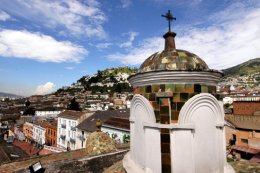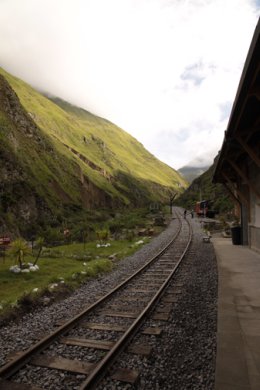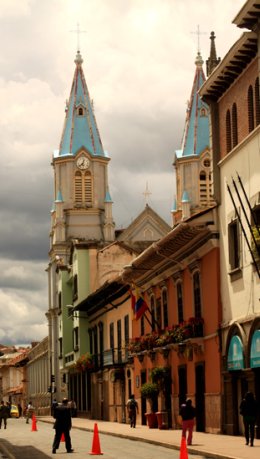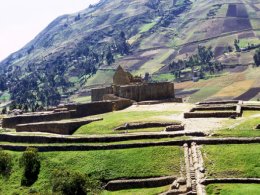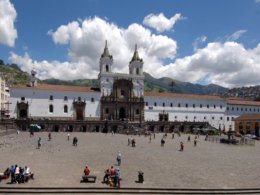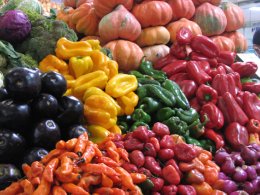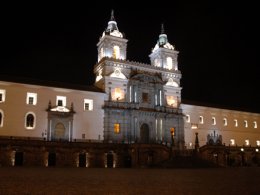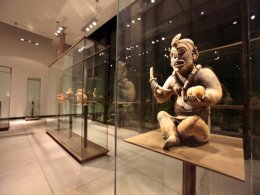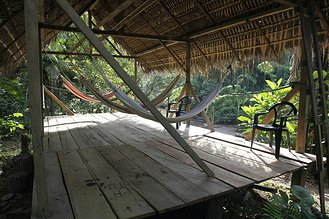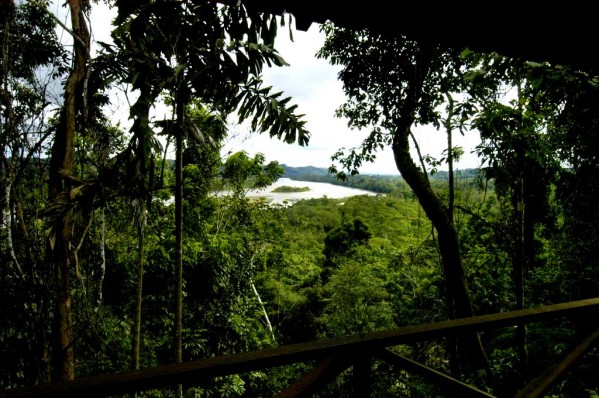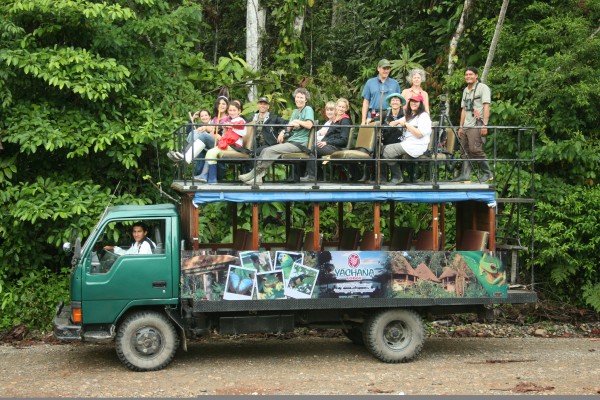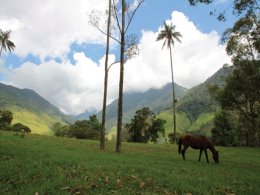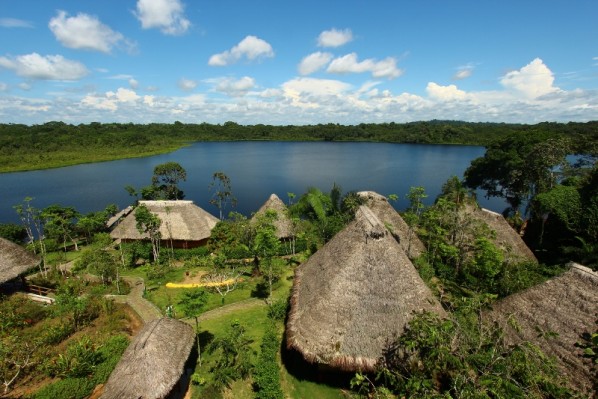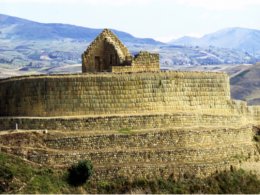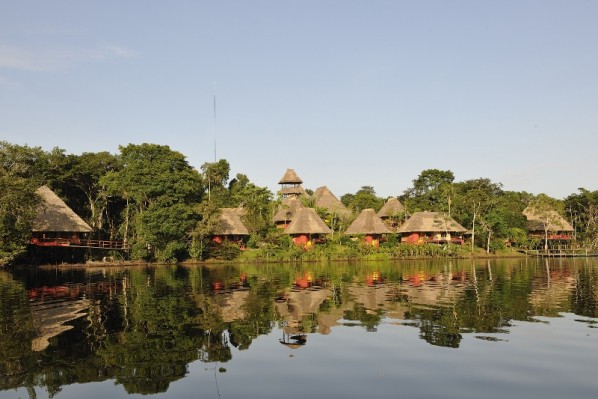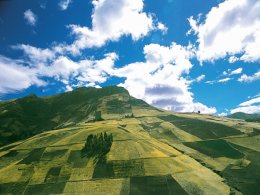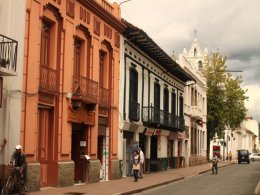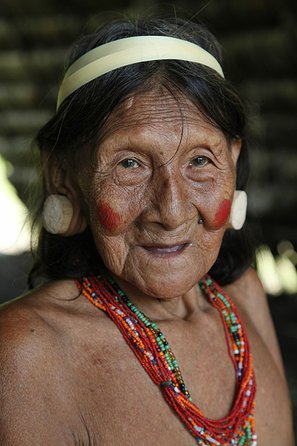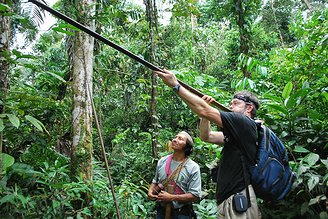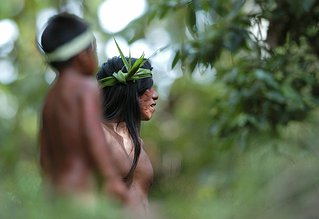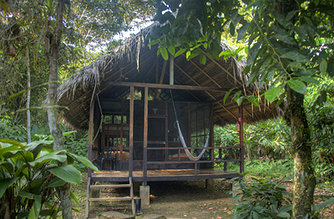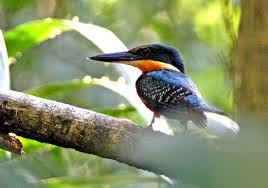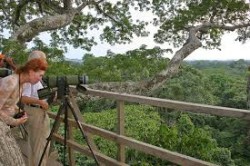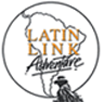Ecuador & Colombia Highlights Itinerary
Day 1 Guayaquil
For those travelling from NZ you can travel on LATAM Airlines direct to Santiago with a connection to Guayaquil , arriving there late evening. On arrival you will be transferred to your hotel.
Accommodation: Grand Hotel
www.grandhotelguayaquil.com
Guayaquil is Ecuador's major commercial city, quite tropical , situated on the coast
Day 2 Guayaquil (B)
A day to get adjusted to local time. We visit the Parque Historico for an insight into the history of Ecuador and its excellent wildlife display . Then a walk along the Malecon waterfront to the Iguana Park .
Day 3 Guayaquil- Cuenca (B)
Later this morning transfer to the bus station and travel by bus from the tropical lowlands through banana plantations and into the Andes climbing to 2500m to the lovely colonial city of Cuenca.
Accommodation: Hotel Casa del Aguila
www.hotelcasadelaguila.com
Day 4 Cuenca (B)
Cuenca is Ecuador’s third largest city; yet it still retains its pleasant provincial air. Its red tiled roofs, cobblestone streets, flowery plazas and museums make it very special. This comprehensive visit includes the Plaza of San Sebastian, a colorful artisans market, where handicrafts are sold. Then, visit the Museum of Modern Art, featuring an excellent collection of contemporary fine art. Next is a visit to the flower market at the small plaza in front of the carved stone entrance to the church of El Carmen de la Asunción. From here, a stroll to the main square, surrounded by the imposing blue-domed Cathedral, the Court of Justice, the Municipal Palace, the Governor’s Palace and the Church of El Sagrario. Free time this afternoon to explore the city a little more or visit one of the local
museums.
Day 5 Cuenca-Alausi (B,D)
A 4 day immersion in the Andean World, from Cuenca, along the Avenue of the Volcanoes, to Quito, through the spectacular scenery of the Andes, with visits to centenary Haciendas, fertile fields of vegetables and roses, in close contact with the local culture. This is a journey along the history, the spirituality, the flavours, the customs, traditions and legends of the Andean Region.After an early breakfast depart by road, to the small town of Alausí, the beating heart of the rehabilitation of the Ecuadorian Railway Company .Great effort has been made to restore the 100-year old train to its old glory and romance. Stations have been renewed, railways and sleepers replaced, engines and classic coaches renovate, and most important, the project involves the local communities along the route in the rail operation. The highlight is the thrilling 800-metre (2630-foot) descent on the zigzag cuttings on the rock of the Devil’s Nose. At the bottom one finds the newly renovated Station of Sibambe. Here here is time to visit the local museum “Condor Puñuna” built and run by the Nizag community, see the display of local handcrafts, fruit and medicinal plants and try the local coffee. The train whistle calls guests back on board for the return to the Station of Alausí, where a light snack is served to regain strength Continue skirting the flanks of the Andes, an astonishing ride, twisting and turning, along bridging ravines and river gorges.
Accommodation: Hotel Noris
Day 6 Riobamba- Patate (B,D)
Continue our journey with a visit to the Chimborazo Fauntistic Reserve. At 6310m Chimborazo is the highest mountain of Ecuador. On the hillsides, where the land is worked by plow,observe the primitive farming methods that have been used for centuries. Great photo opportunities on this route. From here, descend towards the town of Patate, to spend the night at a 300-year old hacienda, hidden among the mountains, a magical ambience. This place is full of stories about those who left in search of the treasure of the Incas in the nearby Llanganatis mountains - and never returned.
Accommodation: Hacienda Manteles
www.haciendamanteles.com
Day 7 Banos -Cotopaxi (B,D)
Drive on to Baños –a town with an international pulse, full of people from all over the world as well as many locals who pilgrimage to the Sanctuary of the Virgin of Holy Water. Drive along the Route of the Cascades to El Pailón del Diablo (the Devil’s Cauldron) –the most adventurous will descend (medium difficulty) to observe the impressive cascade up close, surrounded by subtropical vegetation and orchids. The force and sound of the waters can also be appreciated from a lookout point without descending. From here on we continue our travel along valleys and mountains to the magnificent Cotopaxi Volcano, for an up-close view of the Andean paramo habitat and its unique flora and fauna; a number of high-altitude birds can be observed around Limpiopungo Lagoon, and occasionally, wild horses. On clear days, the perfect snow-capped cone of the Cotopaxi Volcano is quite a sight!
Accommodation: Hacienda La Cienega
www.haciendalacienega.com
Day 8 Cotopaxi - Quito (B)
Visit the Cotopaxi National Park, an ecological sanctuary of 88,920 acres, around the magnificent Cotopaxi Volcano, which rises 5897 meters (19,347 feet) above sea level. The evergreen landscape of the Ecuadorian highlands is one of the main attractions, along valleys and mountains covered by multi coloured fields. We undertake a walk in the Andean paramos of this region, around Lake Limpiopungo enjoying great views of the volcano. We then continue along the Pan American Highway to Quito arriving late afternoon
Accommodation: Hotel La Rabida
www.hostalrabida.com
For those joining the tour at Quito you will be met at Quito airport and transferred to the hotel to join the rest of the group.
Day 9 Quito (B)
Morning tour of Quito including the old city. Optional hike Tour to Teleferico & Guagua Pichincha You will be taken to the Teleférico, a gondola lift, running from the edge of the city up the east side of Pichincha Volcano. It’s one of the highest aerial lifts in the world, and the ascent takes about ten minutes. Hike from the summit of Cruz Loma toward Volcán Guagua Pichincha, a steady uphill trail which takes a couple of hours allowing for pauses to take in the extraordinary views of Quito and the surrounding volcanos
Day 10 Quito – Cuicocha –Cotacachi -Otavalo (B,D)
This morning we head to Calderon , a little village north of the capital , well known for its salt paste figurines. Then to the Cotacachi-Cayapas Nature Reserve, a perfect place to enjoy the landscape and the invigorating mountain air.Travel through the Andean communities of this region ending up on the Equator line in Cayambe. Visit to Quitsato museum. Continue to Cotacachi a village famous for its leather work then to Otavalo
Accommodation: La Casa Sol
Day 11 Otavalo - Salinas (B,D)
An early start to visit the weekly livestock market in Otavalo and the crafts market. Then through Ibarra to Salinas de Ibarra an area of bright green fields of sugarcane which is farmed abundantly in this area.
Accommodation: Hosteria Pantavi
www.hosteriapantavi.com
A superb country hotel with spa and wonderful art collection.
Day 12 El Angel Ecological Reserve -Tulcan -Ipiales (B)
Today we can explore on foot the strange and mystical polylepis and frailejon forests of the Angel Ecological Reserve. Then through the Chota valley, the only part of the Ecuadorian highlands with a very significant Black population descendant from slaves brought to work in the plantations during old colonial times.A warmer and drier region of Ecuador known for its Afro-Ecuadorian people and culture. Journey north to the border town of Tulcan , visit its amazing cemetery. Then cross the border into Colombia . Visit the incredible Las Lajas Sanctuary. Overnight in Ipiales
Day 13 Ipiales -Popayan (B)
A spectacular drive today through deep ravines to arrive in the beautiful city of Popayan late afternoon
Accommodation:Hotel La Plazuela
http://hotellaplazuela.com.co/en
Day 14 Popayan (B)
This small colonial city is famous for its chalk-white facades (its nickname is La Ciudad Blanca, or 'the White City'), and is second only to Cartagena as Colombia's most impressive colonial settlement. It sits beneath towering mountains in the Valle de Pubenza, and for hundreds of years was the capital of southern Colombia, before Cali overtook it. The town was founded in 1537 by Sebastián de Belalcázar, and Popayán became an important stopping point on the road between Cartagena and Quito.Morning tour of the city.
Day 15 Popayan - San Agustin (B)
Enjoy the journey surrounded by the Andean scenery of mountains and high altitude plains. Stop at the market of Silvia, where Guambianos (a local indigenous community) come from the surrounding villages to sell their wares.Continue on to San Agustin arriving early evening.
Accommodation:Akawanka Lodge
www.hotelakawankalodge.com
Day 16 San Agustin (B)
Near San Agustin one finds one of South America's greatest, and most mysterious, archaeological sites, declared a world heritage by UNESCO. Tour to the "Valley of the Statues" which has numerous huge stone carved statues that date back as far as 3000 B.C. The pre-Incan civilization that lived here is shrouded in mystery, even their actual
name is still unknown. Archaeologists have uncovered a mere 10 percent of the statues and ruins, and it is theorised that huge mayan-like pyramids and other structures remain buried throughout the area.
Day 17 San Agustin - Tatacoa-Neiva (B)
Drive north to Villavieja. Today is your chance to get to know the Tatacoa Desert. Visit the red and grey rock formations that make up this one of a kind natural wonder.Continue on to Neiva for overnight
Day 18 Neiva -Salento (B)
Travel into the heart of the country's coffee production through the beautiful Colombian Coffee Cultural Landscape, declared a World Heritage by UNESCO. You will travel through Coffee and Plantain plantations, bamboo forests, exotic fruits among other native species. You will also be able to watch the beauty and diverse Colombian wildlife: birds, butterflies, etc. drive through stunning country lanes to Salento.Its known for its coffee estates and verdant scenery.The town is a gateway to the snow capped peaks of Los Nevados National Park
Accommodation: Hotel Salento Real
Day 19 Salento (B)
today visit a local coffee farm and learn about the production.Then enjoy a hike into the Cocora Valley with its stunning palm trees.
Time to explore Salento this afternoon
Day 20 Salento -Medellin (B)
Travel this morning through to the city of eternal spring -Medellin. The city of Medellin sits in a narrow valley originally inhabited by the Aburras Indians. It is the second largest city in Colombia and is said to be, "One of the most beautiful cities in South America." by experienced travelers who have discovered the magic of Colombia.
Medellin's pleasant spring-like climate year round makes it known as 'La Ciudad de la Eterna Primavera' or "City of the Eternal Spring". Medellin is a safe, modern city filled with sophistication and charm from its Spanish heritage.It is known by its cultural encounters, the warmth of its people and the amazing views that are accompanied by clear blue skies and beautiful sunsets. Sample Medellin's famous nightlife in the Zona Rosa
Accommodation: Hotel Aqua
www.hotelaqua.com
Day 21 Medellin (B)
Medellín is Colombia's industrial leader and also home to some of the friendliest people in the country. It has spring-like weather, plenty of shopping malls, both modern and colonial architecture, and it's surrounded by raw natural beauty
Morning tour of the city Among this tour's highlights are the Metro Cable (K Line), Plaza Botero, the Pueblito Paisa, Parque de los Deseos (Wishes Park), Parque de los Pies Descalzos (Barefoot Park), the botanical garden, and the Metropolitan Cathedral
Afternoon free for shopping or an optional tour to learn about Medellin's infamous Pablo Escobar. Learn about the life and death of Pablo Escobar. This 2-hour historical tour takes you back in time and inside the life of Pablo Escobar, a man both loved and feared by millions of people. Learn about his extensive cocaine operation and visit three historical sites: the Monaco Building, the house where Escobar was killed and his final resting place.
Day 22 Medellin-Bogota (B)
Today will be a full days drive through to the capital Bogota. A stop is made at El Jardin Encantado with its beautiful gardens and impressive range of hummingbirds
Accommodation: Hotel Casa Deco
www.hotelcasadeco.com
Bogota set at an altitude of 2600m with the high ranges of the Cordillera Mountains lying to its east . It is sometimes referred to as the “Athens of the Americas”due to the Bogotanos’ reputation for politeness and civility
Day 23 Bogota (B)
Walking tour of Bogota
Brisk walk along Avenida Jiménez to the foot of Cerro Monserrate. We ascend Monserrate by cable
car to enjoy the spectacular views across the city .After Monserrate, we return to the colonial centre of
La Candelaria and walk between the historic residences dating from the time of Spanish rule. We pass by La Plaza de Chorro de Quevedo the former lookout post of the Zipa Cacique and the site of the foundation of Bogotá in 1538. We continue our walk towards the two blocks of the Banco de la Republic complex where we find The Botero Collection, arguably the most important art collection in South America. Not only does it house the works of one of Colombia's most famous sons, Fernando Botero, but also his own collection of famous masterpieces including works by Dali, Renoir, Chagall, Max Ernst and Picasso. Continue the tour onwards to Plaza Bolívar, the seat of Colombian power where we find El Capitol, the home of Colombian congress, The Palace of Justice, Edificio Liévano, the home of Bogotá's alcaldía and Catedral la Primaria, Bogotá's cathedral.Situated behind El Capitol is Casa Nariño to which we pay a brief visit before ending the tour in La Avenida Séptima with an option to visit The Gold Museum.
Day 24 Bogota -Villa de Leyva (B)
Head north to the town of Zipaquirá. Once here, venture into a salt mine located more than 656 feet (200 meters) below the surface and admire this impressive piece of Colombian architecture. Visit two underground cathedrals carved out of salt.
Continue on to Villa de Leyva which is one of the most beautiful colonial villages in Colombia. Declared National Monument in 1945, the village has been preserved in it’s entirely with cobblestone roads, tiled roofs and whitewashed buildings.
Accommodation: Posada de San Antonio
www.hotellaposadadesanantonio.com
Day 25 Villa de Leyva (B)
We explore Villa de Leyva and surroundings. We will discover one of the most important paleontology regions in South America. This valley is an ancient ocean floor, home to many dinosaur fossils, as well as thousands of ammonites from the Cretaceous period. Evidence is found everywhere including decorations in floors and buildings. Visit El Infiernito, a dry area with waterholes, and the Paleontological Museum which displays the most important assortment of fossils in South America. Here we find the most complete Kronosaurus fossil known to date. Our ride continues all the way to El Monasterio, a magnificent structure originally built in 1620 that was visited by Simon Bolivar himself. It
has a great collection of religious and colonial art, as well as Muisca Indian displays – all adorned with fossils from the area. We return to Villa the Leyva to relax in its time suspended streets and coffee shops.
Day 26 Villa de Leyva - Barichara (B)
Travel by van towards San Gil enjoying the beautiful landscapes along the Suarez River Canyon Continue our drive along a scenic mountain road to Barichara, a perfectly preserved Spanish town declared National Monument in 1978. Barichara is a charming colonial town with a magical ambience. Its cobblestone streets, red tiled roofs, squares, and laid back lifestyle give us the feeling of being transported to another era.
Accommodation: Hotel Mision de Santa Barbara
www.hostalmisionsantabarbara.com
Day 27 Barichara (B)
Begin the day with a hike on a historical trail that was originally built by the Guane Indians. During the colonial era, this trail was rebuilt in stone by the Spanish to gain access to the Atlantic . Along the way we get great views to the gorge below and excellent birding, as a high concentration of species feed and inhabit this area . At the end of this 7km hike we reach Guane, another colonial town that seems lost in time. It has a dreamlike feel and great Spanish architecture. We visit the local anthropological
museum to learn about the extinct Guane culture.Return to Barichara.
Day 28 Barichara -Chicamocha Gorge - Bucarmaranga (B)
Travel through to the town of Jordan at 430m. Located along the Royal Road from the Andes to the Caribbean, El Jordan used to be a prosperous merchant trade center. Today it has an eerie feeling, as it seems to be abandoned. Then into the Chicamocha National Park to ride its cable car that passes through its 6.3 km wide Canyon. We continue our journey to the city of Bucarmaranga.
Accommodation: Hotel Ciudad Bonita
www.hotelcuidadbonita.com.co
Day 29 Bucamaranga-Santa Marta (B)
Our journey by bus takes through the Chichamocha Gorge following the Magdalena River descending down to the Caribbean Coast to Santa Marta. Santa Marta was founded by the Spaniards in 1525 and is the oldest city in South America and is full of magic hard to describe, with its unique architectural heritage, beautiful scenery and a rich cultural heritage. Stay in the nearby beach town of Rodadero .
Accommodation: Be La Sierra Hotel
www.hotelbelasierra.com
Day 30 Santa Marta (B)
Day at leisure to relax on Rodadero Beach or a day tour into Tayrona National Park, framed by lush and unspoiled nature, recognized among the finest in the world.
Day 31 Santa Marta - Cartagena (B)
Tour of Santa Marta, first to San Pedro Alejandrino, the 17th-century hacienda, famous as the site where Simón Bolívar died in 1830. Learn how the military and political revolutionary led Colombia and neighboring Latin American countries to independence from Spanish rule. Continue to Taganga, a small fishing village. Then on through Baranquilla to Cartagena.
Accommodation: Hotel Don Pedro Heredia
www.hoteldonpedroheredia.com
Cartagena de Indias , a lovely walled city which has preserved its colonial heritage and UNESCO World Heritage site . Cartagena was the major trading port from South America to Spain and saw numerous battles for control as its key position as a trading port . Its captivating streets move to a laid back Caribbean rhythm. From Milke Newell's interpretation of the Gabriel Garcia Marquez novel, Love in the Time of Cholera to Robert de Niro's The Mission, Cartagena has been the backdrop to some cinema classics.This evening sample the atmosphere of Cartagena on a Chiva Bus -a 3 hours night drive through the Modern and Colonial City in a typical bus; national drinks, snacks and music included.
Day 32 Cartagena (B)
Walking tour of the old city. Gold-crafting Indigenous tribes, Spanish colonialism, pirates and corsairs, African slaves, fortifications, Catholicism and The Inquisition, immigrants, Independence, cholera, drugs, crime, beauty pageants, books, art and movies: Cartagena has led a very interesting life!
With such a fascinating and turbulent history, you can bet your arepa e huevo that there are plenty of must-see sites and sights for visitors. This tour has a historical focus and we cover the key sites within Centro Histórico and San Diego. We also cover topics such as the architecture, the art, music, food and culture.This evening a farewell
dinner is included at a local restuarant.
Day 33 Depart Cartagena (B)
You will be transferred to the airport
















